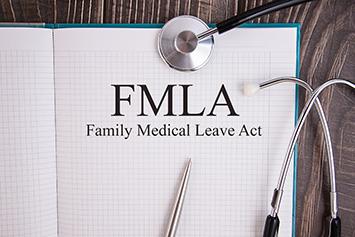Using the Family Medical Leave Act in the time of COVID-19
By MICHAEL C. GOLDBERG
 With the COVID-19 pandemic still moving across the U.S. and a second wave predicted in mid-autumn, the Family and Medical Leave Act (FMLA) has taken on even greater importance.
With the COVID-19 pandemic still moving across the U.S. and a second wave predicted in mid-autumn, the Family and Medical Leave Act (FMLA) has taken on even greater importance.
For workers whose families are affected by COVID-19, the ability to take a pause in their jobs to care for ill family members offers the assurance that their job will be waiting when they return. Unfortunately, the FMLA doesn’t offer financial compensation, and not every employee can take advantage of this benefit because of government-mandated employer criteria.
EMPLOYER REQUIREMENTS
An employee may be covered if their employer meets one of these requirements:
- A private-sector employer with 50 or more employees.
- A public agency including local, state or federal government, regardless of number of employees.
- A public or private elementary or secondary school regardless of the number of employees.
If an employer is eligible, by law it must post a notice explaining employee rights under the FMLA or potentially face a penalty.
EMPLOYEE REQUIREMENTS
Employees must also meet certain qualifications:
- Work for a covered employer.
- Have worked for employer for at least 12 months.
- Have at least 1,250 hours of service with the employer during the 12-month period immediately preceding the requested leave.
- Work at a location where the employer has at least 50 employees within 75 miles.
The 12 months of employment don’t have to be consecutive. Any time an employee has worked for the same employer (including seasonal work) could, in most cases, be used to meet the 12-month requirement. However, if the employee has a break in service of seven years or more, the time worked prior to the break won’t count unless the employee has a specific agreement with the employer by contract or other agreement to the contrary.
REASONS TO USE
FMLA-eligible employees can receive 12 work weeks of leave in a 12-month period for one or more of the following reasons:
- The birth or adoption of a child.
- To care for a spouse, child or parent who has a serious health condition.
- A serious health condition prevents the employee from performing the essential functions of the job.
Under some circumstances, employees may take their FMLA leave on an intermittent or reduced schedule basis.
Employees must comply with their employer’s usual and customary requirements for requesting leave, including requesting leave 30 days in advance when feasible or providing notice as soon as practical.
While not a perfect solution, FMLA does give employees peace of mind that they’ll still have a job when they return from caring for themselves or a loved one.
(Michael Goldberg, a member of CWA Local 6300, is the principle at Michael C. Goldberg Law, LLC. His firm focuses on workers’ compensation, civil litigation, and labor law. Contact him at 314-824-0350 or mike@michaelgoldberglaw.com.)



Leave a Reply